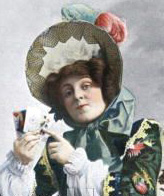Mily-Meyer As Miss Lenormand on:
[Wikipedia]
[Google]
[Amazon]
 Émilie Mily Meyer, stage name 'Mily-Meyer' was a French soprano, born 1852 in
Émilie Mily Meyer, stage name 'Mily-Meyer' was a French soprano, born 1852 in
 Émilie Mily Meyer, stage name 'Mily-Meyer' was a French soprano, born 1852 in
Émilie Mily Meyer, stage name 'Mily-Meyer' was a French soprano, born 1852 in Paris
Paris () is the capital and most populous city of France, with an estimated population of 2,165,423 residents in 2019 in an area of more than 105 km² (41 sq mi), making it the 30th most densely populated city in the world in 2020. S ...
, died there in 1927, who for a quarter of a century became a major star of the Parisian operetta stage, and is described by Gänzl as "impishly boyish yet obviously feminine soubrette".Gänzl, K. ''The Encyclopedia of the Musical Theatre.'' Oxford: Blackwell, 1994.
Career
Her professional début was at the Eldorado café-concert; she then went to theThéâtre de la Renaissance
The name Théâtre de la Renaissance has been used successively for three distinct Parisian theatre companies. The first two companies, which were short-lived enterprises in the 19th century, used the Salle Ventadour, now an office building on th ...
and appeared as the young duchess in the premiere of ''Le petit duc
''Le petit duc'' (''The little duke'') is an opéra comique in three acts by Charles Lecocq. The French language, French libretto was by Henri Meilhac and Ludovic Halévy.
Performance history
The opera was first presented at the Théâtre de la R ...
'' on 25 January 1878. Creations in ''La Camargo
Marie Anne de Cupis de Camargo (15 April 1710 in Brussels – 28 April 1770 in Paris), sometimes known simply as La Camargo, was a French dancer. The first woman to execute the '' entrechat quatre'', Camargo was also allegedly responsible for ...
'' (1878), ''Petite Mademoiselle'' (1879) and ''Belle Lurette
''Belle Lurette'' is a three-act opéra comique with music by Jacques Offenbach and words by Ernest Blum, Edouard Blau and Raoul Toché. It was first performed at the Théâtre de la Renaissance, Paris, on 30 October 1880. The composer died before ...
'' (1880) swiftly followed.
Mily-Meyer appeared at the Théâtre des Nouveautés
The Théâtre des Nouveautés ("Theatre of the New") is a Parisian theatre built in 1921 and located at 24 boulevard Poissonnière (Paris, 9th arr.). The name was also used by several earlier Parisian theatre companies and their buildings, begin ...
as Kate in the French premiere of ''Rip
Rest in peace (RIP), a phrase from the Latin (), is sometimes used in traditional Christian services and prayers, such as in the Catholic, Lutheran, Anglican, and Methodist denominations, to wish the soul of a decedent eternal rest and peace.
...
'' and at the Théâtre des Bouffes Parisiens as Bianca in the first run of ''La Béarnaise
La Béarnaise is an opéra comique in three acts of 1885, with music by André Messager and a French libretto by Eugène Leterrier and Albert Vanloo.
Wagstaff J. André Messager. In: ''The New Grove Dictionary of Opera.'' Macmillan, London and New ...
'' in 1885. Also at Théâtre des Variétés was ''La princesse de Trébizonde
''La Princesse de Trébizonde'' is an opéra bouffe with music by Jacques Offenbach and text by Étienne Tréfeu and Charles-Louis-Étienne Nuitter. The work was first given in two acts at the Theater Baden-Baden on 31 July 1869 and subsequently ...
'', while at the Théâtre des Folies-Dramatiques she was in the French premiere of Millöcker's ''La Demoiselle de Belleville'' ''(Die Jungfrau von Belleville)''.
Among many other operettas in which she sang were ''Roi de Carreau'' (1885) and ''Babolin'' (1884) at the Théâtre des Folies-Dramatiques (November 1884); ''La vie mondaine'' (1885) at the Théâtre des Nouveautés
The Théâtre des Nouveautés ("Theatre of the New") is a Parisian theatre built in 1921 and located at 24 boulevard Poissonnière (Paris, 9th arr.). The name was also used by several earlier Parisian theatre companies and their buildings, begin ...
, and at the Théâtre des Bouffes Parisiens, ''La Béarnaise
La Béarnaise is an opéra comique in three acts of 1885, with music by André Messager and a French libretto by Eugène Leterrier and Albert Vanloo.
Wagstaff J. André Messager. In: ''The New Grove Dictionary of Opera.'' Macmillan, London and New ...
'' (1885), as Benjamine in ''Joséphine'' (1886), ''Gamine de Paris'' (1887), ''Le Retour d'Ulysse'' (1889), ''Le mari de la reine
''Le mari de la reine'' is an opérette in three acts of 1889, with music by André Messager and a French language, French libretto by E Grenet-Dancourt and Octave Pradels.Wagstaff J. André Messager. In: ''The New Grove Dictionary of Opera.'' Mac ...
'' (1889), ''Cendrillonnette'' (1890) and revivals of ''Les petits mousquetaires'' and ''La Princesse de Trébizonde''. Back at the Renaissance, she created ''La gardeuse d'oies'' (1888) and ''La petite Poucette'' (1891); followed by ''La Demoiselle du Téléphone'' (1891) at the Nouveautés, ''Fleur de Vertu'' (1894) at the Bouffes, and ''L'Élève du Conservatoire'' (1894) at the Théâtre des Menus-Plaisirs.Martin, J. ''Nos artistes des théâtres et concerts.'' Paris: Paul Ollendorff, 1895.
Chabrier
Alexis-Emmanuel Chabrier (; 18 January 184113 September 1894) was a French Romantic music, Romantic composer and pianist. His Bourgeoisie, bourgeois family did not approve of a musical career for him, and he studied law in Paris and then worked ...
dedicated his 1889 'Villanelle des petits canards' to Mily-Meyer, who gave the song's premiere at the Théâtre du Vaudeville
The Théâtre du Vaudeville was a theatre company in Paris. It opened on 12 January 1792 on rue de Chartres. Its directors, Piis and Barré, mainly put on "petites pièces mêlées de couplets sur des airs connus", including vaudevilles.
Af ...
on 7 March 1890.Delage, R. ''Emmanuel Chabrier.'' Fayard, Paris, 1999.
Mily-Meyer continued to appear on stage up until 1906.
References
{{DEFAULTSORT:Mily-Meyer 1852 births 1927 deaths Musicians from Paris French operatic sopranos 19th-century French women singers